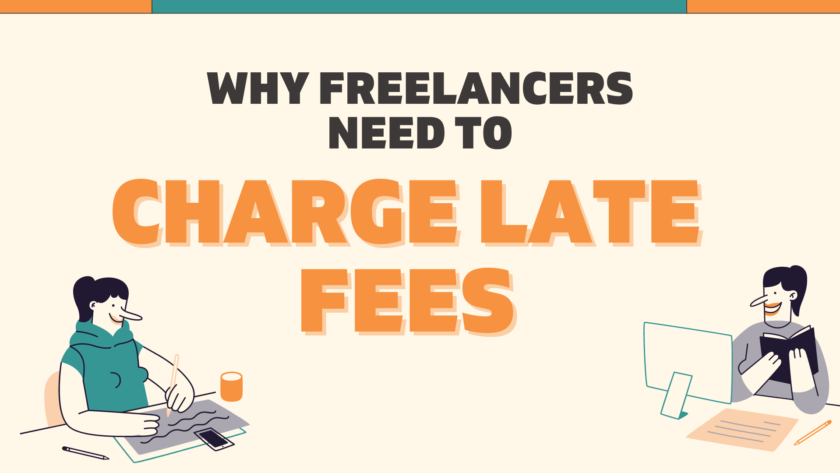This blog may contain affiliate links, meaning we’ll earn a small commission if you purchase from any of these links. You can learn more about affiliate links on this site here.
Estimated reading time: 9 minutes
Table of contents
It’s a common struggle for freelancers: balancing the need to get paid on time with maintaining a strong client relationship. If payments are coming in late, it can disrupt your cash flow, making it harder to run your business. But if you start charging late fees, you worry about scaring clients away. Here’s the good news – it’s possible to charge late fees without damaging your relationship with clients. This is why freelancers need to charge late fees. And in this article, I’ll show you how to do it tactfully and professionally.
Understanding the Importance of Late Fees for Freelancers
Late payments can have a significant financial impact on your business, and it is crucial to establish clear payment terms from the start. In this section, we will delve into the financial impact of late payments, setting clear payment terms, and why freelancers need late fees.
The Financial Impact of Late Payments
Late payments can disrupt your cash flow and hinder your ability to manage your finances effectively. As a freelancer, you rely on regular and timely payments to cover your expenses and maintain a stable income. When clients fail to pay on time, it can cause stress and uncertainty, making it challenging to meet your financial obligations.
Additionally, late payments can lead to a domino effect, causing a cascade of financial difficulties. If you are unable to pay your own bills and vendors on time due to late payments from clients, it can harm your professional reputation and strain relationships with essential suppliers.
Setting Clear Payment Terms from the Start
To avoid the negative consequences of late payments, it is crucial to establish clear payment terms with your clients from the very beginning. Clearly communicate your payment expectations, including due dates, preferred payment methods, and any late fee policies. By setting these expectations upfront, you can minimize the chances of encountering payment delays.
Some freelancers I know do this with a comprehensive contract or agreement that outlines the terms and conditions of their freelance services, including payment terms. This document serves as a reference point for both you and clients and can help prevent misunderstandings or disputes regarding payments.
For me, I communicate the due date, late fee policies, and payment methods via my invoice. In FreshBooks, I set up my template to clearly state the late fee policy and the invoice terms. I have never needed a contract to enforce these, but I know some freelancers prefer the contract method.
Why Freelancers Need Late Fees
Late fees act as a deterrent for clients who may otherwise be inclined to delay payment without consequences. By implementing late fees, you establish boundaries and encourage clients to prioritize timely payments.
Late fees also help compensate for the additional time and effort you may need to invest in tracking down late payments and following up with clients. As a freelancer, your time is valuable, and late fees can serve as compensation for the administrative tasks associated with managing late payments.
Moreover, late fees can help ensure that you are paid fairly for your work. By charging a fee for late payments, you are acknowledging the impact that delayed payments have on your business and emphasizing the importance of timely compensation for your services.
The financial impact of late payments can be significant, and clear payment terms and late fees are essential tools for managing your cash flow and ensuring fair compensation. By implementing late fees, you establish boundaries, encourage timely payments, and protect the financial stability of your freelance business.
How to Implement Late Fees Without Alienating Clients
Late payments can be a frustrating challenge for freelancers. Not only do they disrupt cash flow, but they can also strain client relationships. However, implementing late fees doesn’t have to result in alienation. By taking a proactive and professional approach, you can ensure that your clients understand and respect your payment terms while maintaining a positive working relationship. In this section, we will explore effective strategies for implementing late fees without alienating your clients.
Communicating Payment Terms Effectively
Clear communication is key when it comes to payment terms. From the very beginning of your client relationship, it’s important to establish a mutual understanding of your expectations regarding payment. Here are some tips for effectively communicating payment terms:
- Be upfront and transparent: Clearly state your payment terms in your initial contract or agreement. Include information such as due dates, accepted payment methods, and consequences for late payments. (Since I don’t tend to use contracts, I just explain this in writing once we decide to work together.)
- Use simple, jargon-free language: Avoid using complex legal terms that may confuse your clients. Instead, use plain language that clearly explains your payment terms and expectations.
- Provide reminders: Send friendly reminders to your clients a few days before their payment is due. This helps to ensure that they are aware of the upcoming deadline and encourages timely payments.
Establishing a Late Fee Policy
Having a clear late fee policy in place sets expectations and reinforces the importance of timely payments. Consider the following when establishing your late fee policy:
- Define the late fee structure: Determine a reasonable late fee percentage or flat fee that will be charged for overdue payments. Make sure it is fair and aligns with industry standards.
- Include the late fee policy on your invoice: Clearly state your late fee policy on each invoice. This ensures that your clients are aware of the consequences of late payments.
- Set a grace period: Consider offering a short grace period before late fees apply. This demonstrates flexibility and allows for unforeseen circumstances that may cause minor delays in payment.
How Much Can I Charge for Late Fees
Keep in mind that a late fee isn’t meant to punish. It shouldn’t be taken personally or viewed as a criticism of your client. Instead, it’s simply a necessary part of running a business. Most companies (including your own clients!) have similar fees, so your client is likely familiar with them. As a freelancer with limited time and no ability to adjust your schedule as a company can, it’s crucial for you to track your hours and ensure you get paid for the work you’ve done.
Late fees help you maintain profitability and efficiency, and they also encourage your clients to make timely payments – all in a professional manner.
Personally, I do a percentage instead of a flat fee. A flat fee would be something like $50 for every late payment. Instead, the terms on my invoices read:
30 Day Terms | 10% of the invoiced amount will be billed for every 15 days the invoice is past due.
I give a grace period of 15 days, and then I start billing 10%. So on day 16, I invoice 10%. Then again 15 days later, I add another 10%. Keep in mind, the whole time I am providing reminders and communicating with my client. Late fees are not a way to get rich – it is solely to cover your administrative time tracking down the payment and to get your client to take the payment more seriously.
Handling Late Payments Professionally

Despite your best efforts, late payments may still occur. How you handle these situations can greatly impact your relationship with your clients. Here’s how to handle late payments professionally:
- Send polite reminders: Start with friendly reminders to notify your clients about their overdue payments. Use a polite and professional tone, avoiding accusatory language.
- Follow up with a firm but friendly approach: If reminders don’t result in payment, reach out to your clients with a more assertive tone. Clearly communicate the consequences of further delays and emphasize the importance of prompt payment.
- Consider installment plans: In some cases, offering clients the option to pay in installments can help them manage their financial obligations. This can be a mutually beneficial solution that avoids strain on the client-freelancer relationship.
Here’s the exact email I send to follow up on a late payment:
Hi {Name of Person in Accounting/Payables},
I haven’t received the payment for invoice #### that was due on {date}. I’m attaching an updated invoice (which includes a late fee).
Please let me know if you have any questions.
Thank you!
Kaitlyn
The person in Accounts Payable came back and asked for me to not charge late fees, and I very nicely explained that since this was not the first time they had been late, I would not waive the fee. For me, I found that the AP team didn’t realize how often they were paying my invoices 2-6 weeks late, and it hasn’t happened again since.
By effectively communicating payment terms, establishing a clear late fee policy, and handling late payments professionally, you can implement late fees without alienating your clients. Remember, maintaining a positive relationship while ensuring timely payments is possible with a proactive and professional approach.
Tips for Enforcing Late Fees and Maintaining Client Relationships
Late payments can be a frustrating aspect of freelancing, but enforcing late fees doesn’t have to strain your relationship with your clients. By following these tips, you can maintain a professional approach while still ensuring that you receive timely payments.
Sending Polite Reminders
When a client’s payment is overdue, it’s important to send polite reminders to prompt them to make the payment. Start with a friendly tone, reminding them of the agreed-upon payment terms and the importance of timely payments. Clearly state the consequences of late payment, including the late fees that will be incurred if the payment is not received promptly.
Consider using active voice and engaging language to make your reminders more effective. For example, instead of saying, “Your payment is overdue,” you could say, “We’re excited to continue working with you! To ensure a smooth process, we kindly request that you settle your outstanding balance within the next 48 hours.”
Take a look at any freelancing software you use – many of them can automate this for you.
Negotiating Payment Plans
In some cases, clients may be experiencing financial difficulties that prevent them from paying on time. Consider negotiating a payment plan that works for both parties. This approach can help maintain a positive relationship while still ensuring that you receive your payment.
When discussing a payment plan, be empathetic and understanding. Use rhetorical questions to engage your client and make them feel involved. For instance, you could say, “We understand that unexpected financial challenges can arise. Would it be possible for us to set up a reasonable payment plan that accommodates your current situation?”
By working collaboratively, you can find a resolution that benefits both parties and avoids the need for legal intervention.
Clients Who Continue to Not Pay on Time
In my freelance practice, I do my best to work with reputable small and medium-sized businesses who treat me, my work, and my time with respect. This means not continuing to work with someone who does not pay on time. It’s okay to tell a client that you won’t be working with them anymore. In fact, it’s one of the reasons freelancing is so great – you get to choose who you want to work with. Take time to set some boundaries for yourself – how many times can someone be late before you don’t want to work with them anymore?
Conclusion
In conclusion, freelancers need to charge late fees to maintain healthy client relationships and a sustainable business. By charging late fees, you are not only valuing your time and work but also ensuring that your clients understand the importance of timely payments. Remember to clearly communicate your late fee policy upfront as well as on every invoice, and be consistent in enforcing it. A well-structured late fee policy can help you avoid awkward conversations about late payments and provide a fair and professional approach to handling overdue invoices. So, don’t hesitate to implement late fees and protect your business while maintaining professionalism with your clients.
What’s Next?
If you liked this blog, we think you’ll like these:








